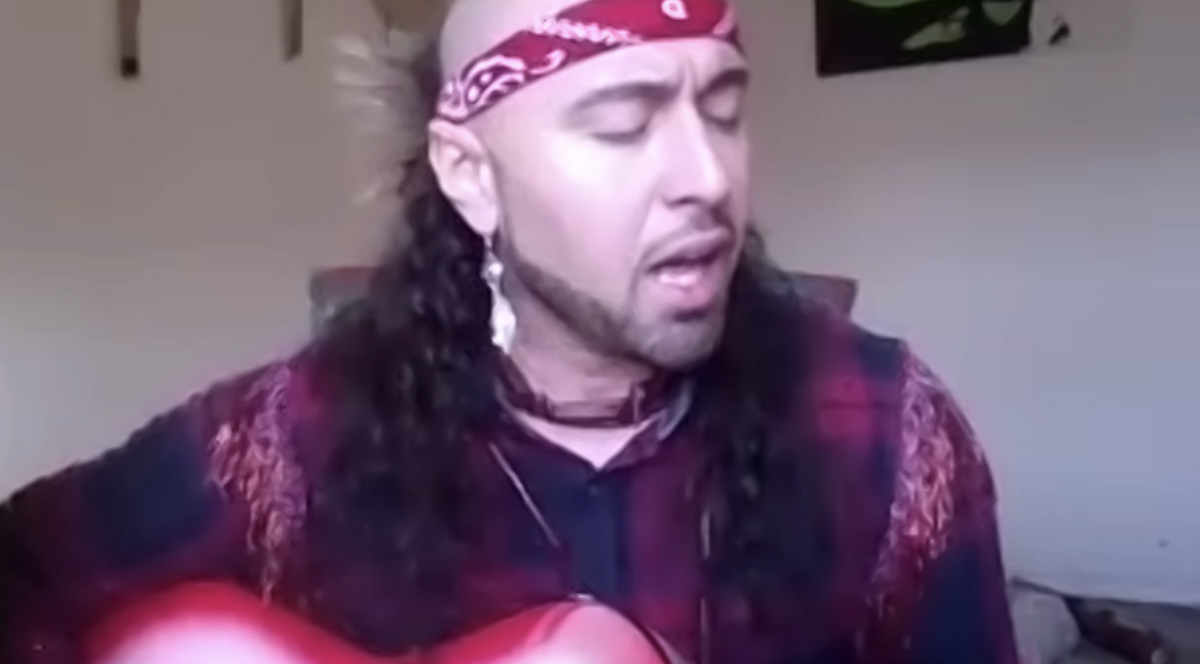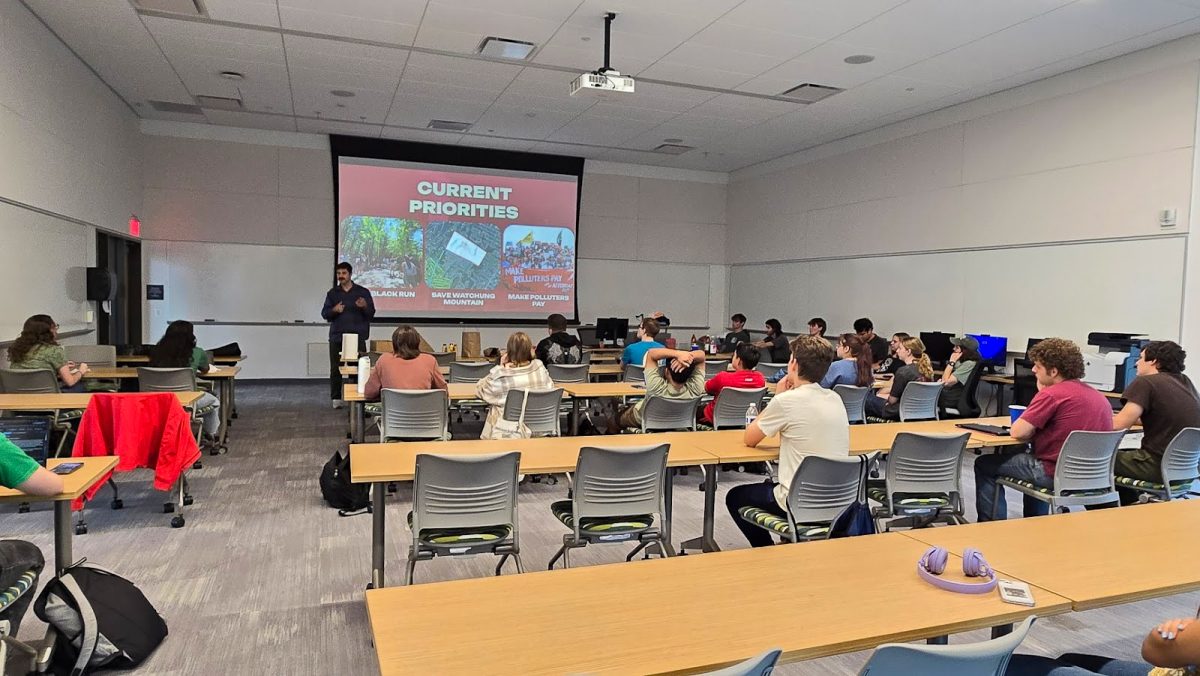On Monday, Nov. 9, the Office of Social Justice, Inclusion, and Conflict Resolution (SJICR) invited two-spirit Cherokee pop artist and activist Tony Enos to speak on the importance of honoring the cultural traditions of the Indigenous peoples of North America.
The event, called “Re-Imagining Social Justice: From Decolonization to Indigenization,” featured some live performances from Tony Enos and conversations surrounding American society’s lack of attention to Indigenous people.
Born and raised in Philadelphia, Enos is a part of multiple Cherokee tribes and is also a guest to the Lenape and Susquehanna clans, among others. He has written and produced his music for about a decade independently and is a two-time Native American Music Awards nominee.
The Cherokee people’s traditional lands were areas within North Carolina, South Carolina, Georgia, Alabama, and Tennessee. However, after the Trail of Tears, Enos’s ancestors settled against their will in northeastern Oklahoma, where over half the estimated enrolled Cherokee members live today.
“Unfortunately a lot of disenfranchisement and disconnection from our tribal lands affected many Indigenous people. They had such a difficult way to go in terms of finding a place to settle after being forced off their land,” Enos said. “There are microcosms and nuances to understand when it comes to where people settled and the location of reservations. Also, what federal benefits come along with that land like Indian Health Services (IHS); things you can only get if you stay on your reservation land.”
Enos highlights that federal recognition is a double-edged sword. This is because the federal benefits allotted to reservations often fall flat from the needs of the people on them.
“When a government wants a natural resource on your land, they give you federal recognition for it. I feel like that goes against tribal sovereignty,” Enos said. “What ends up often happening in our community is that enrolled Natives use that to oppress those who aren’t enrolled.”
Enos presented photographs of early 20th-century students at Carlisle Indian Industrial School in Pennsylvania, the first federally funded off-reservation Native American boarding school in the United States.

Enos believes that the Carlisle Indian Industrial School highlights the cultural genocide Indigenous people experience.
“The Carlisle Indian School is the flagship or blueprint for Native assimilation across the country. What kills me is the burial ground with 186 graves. If you think about if one of our schools today had a burial ground where students die, there would be outrage,” said Enos. “Children had their language beat out of them, got haircuts, forced to wear uniforms, taught English and not their native tongue, and the girls were often sterilized at young ages.”
The term “cultural genocide” was not recognized during the time Carlisle Indian School was operating. Today, Uyghurs in China are subject to similar policies as that of the Natives at Carlisle.
Enos performed his song “Every Sister Home” with his acoustic guitar during the event. The song is dedicated to Olivia Lone Bear, a Native American woman who went missing on Oct. 25, 2017. She was later found dead in 2018, strapped to the passenger seat of a submerged truck in North Dakota.
Enos believes his song can help heal and bring awareness to Native women who are often forgotten by the country.
According to “To’ Kee Skuy’ Soo Ney-Wo-Chek,'” a report by various Indigenous tribes in July 2020, there are 2,306 missing Native American women and girls in the U.S., about 1,800 of whom were killed or vanished within the past 40 years.
Enos highlights work from Abigail Echo-Hawk, M.A., the chief research officer at Seattle Indian Health Board and the director of the Urban Indian Health Institute (UIHI). Specifically, Enos shared a 2018 UIHI report that analyzed cases of missing and murdered Indigenous women.
The report states that out of 5,712 cases of missing and murdered Indigenous women and girls in 2016, only 116 of them were logged into the Department of Justice database. Additionally, the third leading cause of death among American Indian/Alaska Native women is murder.
“It’s another means of erasure. It’s systematic oppression. It’s something to be aware of as we try to ‘decolonize our brains’ and build more inclusive and aware systems,” said Enos.
He argues that people need to find better ways to engage others, particularly when it comes to those ignorant of the plights of Indigenous people.
“Acknowledging the past is very important. But what is uncomfortable about these conversations, especially with folks of non-Native background, is that people end up feeling guilty,” Enos said. “Guilt is such a waste of emotion; nothing good can come from it. A better outcome to look for is a call to action…acknowledge the past and how this land came into the hands of those who have it now. Acknowledge the systems in place for the past 527 years to oppress and frankly genocide and erase Native people.”
A significant facet of Enos’s music is his gender identity of two-spirit. Two-spirit is an umbrella term coined in the ’90s by gay Native Americans. It describes an individual with both a masculine and a feminine spirit; however, it’s unique from similar gender descriptors considering its roots within traditional Native American gender roles.
Enos ended with a song from his fourth studio album “POSI+IVE” that chronicles his journey as a person living with HIV since his diagnosis in July of 2006.
“I came out of the closet as an HIV+ two-spirit man. I think people hearing HIV next to anything Native American is important. There’s an unhealthy attitude in our communities,” he said. “Often you hear that isn’t our disease; it was brought here. Meanwhile, we are losing Native folks because of our ignorant attitude toward HIV. I thought it was important to come out of the closet in a sense; it wasn’t a service to anyone to keep it secret, least of all myself.”
For comments/questions about this story, email [email protected] or tweet @TheWhitOnline.



































































































































































































